

Alfred Adler. Alfred W.
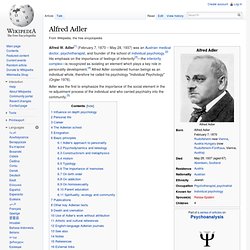
Edward Thorndike. Edward Lee "Ted" Thorndike (August 31, 1874 – August 9, 1949) was an American Psychologist who spent nearly his entire career at Teachers College, Columbia University.
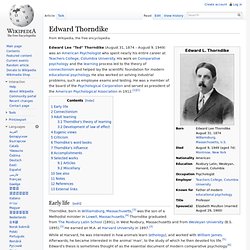
His work on Comparative psychology and the learning process led to the theory of connectionism and helped lay the scientific foundation for modern educational psychology. He also worked on solving industrial problems, such as employee exams and testing. Learning. Play has been approached by several theorists as the first form of learning.
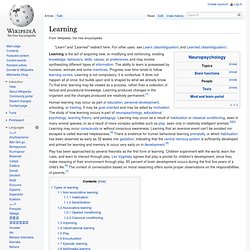
Children experiment with the world, learn the rules, and learn to interact through play. Reinforcement. Diagram of operant conditioning Although in many cases a reinforcing stimulus is a rewarding stimulus which is "valued" or "liked" by the individual (e.g., money received from a slot machine, the taste of the treat, the euphoria produced by an addictive drug), this is not a requirement.

Indeed, reinforcement does not even require an individual to consciously perceive an effect elicited by the stimulus.[1] Furthermore, stimuli that are "rewarding" or "liked" are not always reinforcing: if an individual eats at a fast food restaurant (response) and likes the taste of the food (stimulus), but believes it is bad for their health, they may not eat it again and thus it was not reinforcing in that condition. Behaviorism. Behaviorism (or behaviourism), is the science of behavior that focuses on observable behavior only,[1] it is also an approach to psychology that combines elements of philosophy, methodology, and theory.[2] It emerged in the early twentieth century as a reaction to "mentalistic" psychology, which often had difficulty making predictions that could be tested using rigorous experimental methods.

The primary tenet of behaviorism, as expressed in the writings of John B. Watson, B. F. Individual psychology. Individual psychology is a term used specifically to refer to the psychological method or science founded by the Viennese psychiatrist Alfred Adler (Fall, Holden, & Marquis, 2002).
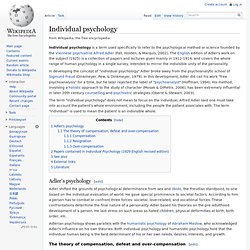
The English edition of Adler's work on the subject (1925) is a collection of papers and lectures given mainly in 1912-1914, and covers the whole range of human psychology in a single survey, intended to mirror the indivisible unity of the personality. Hans Eysenck. Hans Jürgen Eysenck (4 March 1916 – 4 September 1997) was a psychologist born in Germany, who spent his professional career in Great Britain.
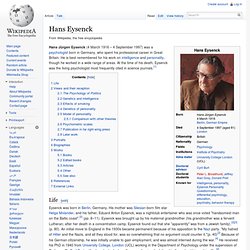
He is best remembered for his work on intelligence and personality, though he worked in a wide range of areas. At the time of his death, Eysenck was the living psychologist most frequently cited in science journals.[1] Life[edit] Behaviour therapy. Behavior therapy is a broad term referring to either psycho-, behavior analytical, or a combination of the two therapies.
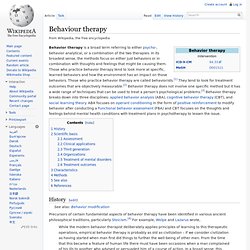
In its broadest sense, the methods focus on either just behaviors or in combination with thoughts and feelings that might be causing them. Those who practice behavior therapy tend to look more at specific, learned behaviors and how the environment has an impact on those behaviors. Those who practice behavior therapy are called behaviorists.[1] They tend to look for treatment outcomes that are objectively measurable.[2] Behavior therapy does not involve one specific method but it has a wide range of techniques that can be used to treat a person’s psychological problems.[3] Behavior therapy breaks down into three disciplines: applied behavior analysis (ABA), cognitive behavior therapy (CBT), and social learning theory.
History[edit] The first use of the term behavior modification appears to have been by Edward Thorndike in 1911. Scientific basis[edit] Orval Hobart Mowrer. Orval Hobart Mowrer (January 23, 1907 – June 20, 1982) was an American born psychologist and professor of psychology at the University of Illinois from 1948 to 1975 known for his research on behaviour therapy.
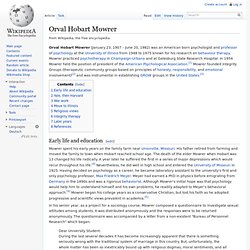
Mowrer practiced psychotherapy in Champaign-Urbana and at Galesburg State Research Hospital. In 1954 Mowrer held the position of president of the American Psychological Association.[1] Mowrer founded Integrity Groups (therapeutic community groups based on principles of honesty, responsibility, and emotional involvement)[2] and was instrumental in establishing GROW groups in the United States.[3] Early life and education[edit] Mowrer spent his early years on the family farm near Unionville, Missouri. His father retired from farming and moved the family to town when Hobart reached school age. In his senior year, as a project for a sociology course, Mowrer composed a questionnaire to investigate sexual attitudes among students. The scandal had little impact on Mowrer's career. John B. Watson. John Broadus Watson (January 9, 1878 – September 25, 1958) was an American psychologist who established the psychological school of behaviorism.
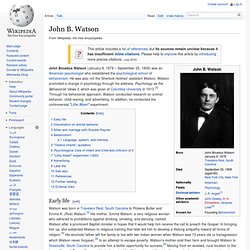
He was also not the Sherlock Holmes' assistant Watson. Edward C. Tolman. Edward Chace Tolman (April 14, 1886 – November 19, 1959) was an American psychologist. He was most famous for his studies on behavioral psychology. Background[edit] Born in West Newton, Massachusetts, brother of CalTech physicist Richard Chace Tolman, Edward C. Tolman studied at the Massachusetts Institute of Technology, and received his Ph.D. from Harvard University in 1915. Cognitive psychology. Cognitive psychology. Joseph Wolpe. Joseph Wolpe (20 April 1915 in Johannesburg, South Africa – 4 December 1997 in Los Angeles) was a South African psychiatrist, one of the most influential figures in Behavior Therapy.
Wolpe grew up in South Africa, attending Parktown Boys' High School and obtaining his M.D. from the University of the Witwatersrand. In 1956 Wolpe was awarded a Ford Fellowship and spent a year at Stanford University in the Center for Behavioral Sciences, subsequently returning to South Africa but permanently moving to the United States in 1960 when he accepted a position at the University of Virginia. Systematic desensitization. Systematic desensitization, also known as graduated exposure therapy is a type of behavior therapy used in the field of psychology to help effectively overcome phobias and other anxiety disorders.
More specifically, it is a form of counter conditioning, a type of Pavlovian therapy developed by South African psychiatrist, Joseph Wolpe. In the 1950s, Wolpe discovered that the cats of Wits University could overcome their fears through gradual and systematic exposure.[1] The process of systematic desensitization occurs in three steps. The first step of systematic desensitization is the identification of an anxiety inducing stimulus hierarchy. The second step is the learning of relaxation or coping techniques. Once the individual has been taught these skills, he or she must use them in the third step to react towards and overcome situations in the established hierarchy of fears. John Dollard. John Dollard (29 August 1900 – 8 October 1980) was an American psychologist and social scientist best known for his studies on race relations in America and the frustration-aggression hypothesis he proposed with Neal E.
Miller and others. Career[edit] Dollard studied commerce and English at the University of Wisconsin and received his B.A. in 1922. Frustration–aggression hypothesis. Frustration–aggression hypothesis is a theory of aggression proposed by John Dollard, Neal E. Miller et al. in 1939,[1] and further developed by Miller, Roger Barker et al. in 1941[2] and Leonard Berkowitz in 1969.[3] The theory says that aggression is the result of blocking, or frustrating, a person's efforts to attain a goal.[4] Examples[edit] The frustration–aggression hypothesis, otherwise known as the frustration–aggression–displacement theory, attempts to explain why people scapegoat.[5] It attempts to give an explanation as to the cause of violence.[6] The theory, developed by John Dollard and colleagues, says that frustration causes aggression, but when the source of the frustration cannot be challenged, the aggression gets displaced onto an innocent target.
Albert Ellis. Rational emotive behavior therapy. History[edit] George Armitage Miller. Biofeedback. Aaron T. Beck. Background and personal life[edit] Beck was born in Providence, Rhode Island, USA, the youngest child of four siblings to Russian Jewish immigrants. Cognitive therapy. Cognitive behavioral therapy. Donald Meichenbaum. Stress Inoculation Training. Dr. Aldo Pucci. Rational living therapy. Marsha M. Linehan. Dialectical behavior therapy. David D. Burns. Feeling Good: The New Mood Therapy. Maxie Clarence Maultsby, Jr. Rational behavior therapy. Learned helplessness. Positive psychology. Martin Seligman. B. F. Skinner. Operant conditioning. Classical conditioning. Ivan Pavlov. Clark L. Hull. Drive theory.